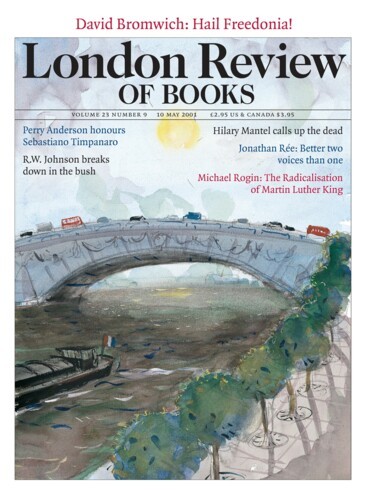One of the best stories in Neonlit: ‘Time Out’ Book of New Writing Volume 2 (1999) is ‘Shelf Life’ by Tom Bromley. The story’s working title, which mysteriously disappeared somewhere between proofs and final publication, was ‘The Curse of Captain Corelli’s Mandolin’. The protagonist is a first novel that consistently fails to sell; which wouldn’t be much of a story, were it not for the fact that every potential purchase is thwarted by some minor event that just happens to involve Louis de Bernières’s crowd-pleaser. If remaindered books could speak, how many of the hundreds of novels published in this country each year would tell a similar story? (Talk about giving a voice to the voiceless.) Reincarnated as a film tie-in with Nicolas Cage and Penelope Cruz picturesquely clinching on the cover, Captain Corelli is now bludgeoning its way back up the charts. But even for those novels not fortunate enough to have their cud chewed by Hollywood (Joanne Harris’s backlist, incidentally, is selling like hot chocolate), help may still be at hand in the form of literary prizes.
The Booker, which despite Martin Amis’s best protests still considers itself ‘Britain’s most prestigious literary accolade’ (whatever that means), won’t be bestowed until 17 October, and the shortlist isn’t due till mid-September, but the hype began to trundle back in February, when the judges were announced. Whoever wins the Booker takes home £9000 less than the winner of the Orange Prize, ‘the UK’s largest and richest annual book award for fiction’, for which the shortlist is to be announced today (10 May). There’s always a certain amount of fuss about whether or not it’s fair to exclude men from the competition, and just to ensure the debate doesn’t sputter out, this year a ‘jury of men’ has been appointed to select a shortlist, too, which will be revealed after the official selection has been made public. The point of the male panel, other than to increase coverage of the prize, is ‘to further test’ research published by the Orange Prize last year ‘that supported the contention that women novelists have to work harder to be taken seriously by both sexes’. (This is in keeping with a study carried out in Sweden in 1997 which found academic peer review to be much harsher in its consideration of women than of men.) Other important things to know about the Orange Prize for Fiction – ‘Notes to Editors’ – include a lot of data such as the following: ‘Orange provides high quality coverage to 99 per cent of the UK population and over 80 per cent of the geographic area. Coverage is based on hand portable, unlike some other operators which choose to base their coverage on boosted car kits.’ Fascinating.
But the godfather of literary prizes, cash-wise, is the International Impac Dublin Literary Award, at IR£100,000 ‘the world’s richest’, the winner of which is to be announced at Dublin Castle on Monday (14 May). The staggering sums involved must have confused someone at Midas (no, really), the prize’s PR firm, who seems to think odds of 4-1 are shorter than 5-2. Impac, for the record, is a ‘management-engineering company’, and shouldn’t be confused with Immac, which is a brand line of depilatory treatments.
The 43-year-old WHSmith Literary Award, forced to compete in an ever-expanding marketplace and unable to lay claim to any absolute superlatives – it’s merely ‘one of the oldest and most prestigious’ – was this year incorporated into the new WHSmith Book Awards, most of which were decided by a public vote, as an allegedly democratic gesture against the elitism of literary prizes. Zadie Smith won in the New Talent category; Jamie Oliver was best for Home and Leisure and Simon Schama for General Knowledge; J.K. Rowling wrote the best children’s book and Maeve Binchy’s Scarlet Feather won the Fiction Award. These results, of course, could have been predicted with a fair degree of accuracy by anyone casting their eye over the bestseller lists, which is hardly surprising, since there was no obligation for voters to read every book in each category. Someone could write a story about it, called ‘The Curse of Scarlet Feather’. The Literary Award, still chosen in the time-honoured way by people who’ve read all the contenders and haven’t had to buy them from WHSmith, was won by Philip Roth’s The Human Stain – not, incidentally, on the shortlist that the ‘unelitist’ organisers offered the voters.
Which brings us to the all-new Short Cuts Awards 2001. The winner in the Most Laconic Dedication category is Hartmut Lange, whose Missing Persons, published by Toby Press, is translated from the German by Helen Atkins. The acknowledgments, in their entirety, run: ‘I am grateful to my wife for her assistance.’ An example to us all. The Biggest Bar of Chocolate Prize goes to the publicity department of Voyager (an imprint of HarperCollins and ‘the publishers of J.R.R. Tolkien and David Eddings’) for sending out half a kilo of Dairy Milk with every review copy of David Zindell’s The Lightstone, Book One of the Ea Cycle: ‘The Lord of the Rings meets Le Morte D’Arthur . . . 942 pages to keep you away from work and up all night lost in this rich magical tale. To help you along the way, we have enclosed a treat to sustain you on your journey’ – no bathos, presumably, intended. And finally, the Too-Honest-for-its-Own-Good Press Release Award is won by the American publisher Noble House for describing the plot of Journey by Denise Neita-Chen as ‘a wildly convoluted, soap opera-like jumble of events’. With publicity like this, who needs reviews? Congratulations and leg wax all round.
Send Letters To:
The Editor
London Review of Books,
28 Little Russell Street
London, WC1A 2HN
letters@lrb.co.uk
Please include name, address, and a telephone number.

